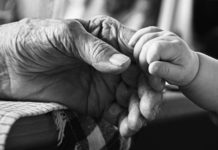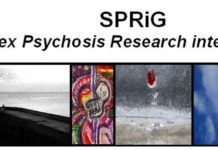Stigma May Increase Distress in Individuals Who Hear Voices
Review finds that stigma around voice hearing is connected to isolation, secrecy, and poorer functioning.
Research Finds Parents’ Trauma May Impact Children’s Health
Study uncovers some of the intergenerational consequences of adverse childhood experiences (ACEs).
Antidepressants Not Superior to Psychotherapy for Severe Depression
On Wednesday, JAMA Psychiatry released a meta-analysis comparing the results of cognitive-behavioral therapy and antidepressant medication in severely depressed populations. Currently, many practice guidelines suggest that antidepressants be used over psychotherapy for major depressive disorder. The analysis, however, found that “patients with more severe depression were no more likely to require medications to improve than patients with less severe depression.”
Social Recovery Therapy for First Episode Psychosis
Social Recovery Therapy shows promising results for individuals who experience first-episode psychosis.
New Findings Suggest Masculinity is a Risk Factor for Suicidal Thinking
Men who report being self-reliant may be at greater risk of suicidal thinking.
Mindfulness and Self-Compassion Interventions Target Depressive Symptoms
A new study finds self-coldness predicts depressive symptoms and supports self-compassion as a buffer.
Therapists Collaborate with Clients through Metatherapeutic Communication
Researchers develop an initial framework for understanding metatherapeutic communication practices that may inform future integration of collaboration in psychotherapy.
Searching for a Rose Garden: Challenging Psychiatry, Fostering Mad Studies
Searching for a Rose Garden:
Challenging Psychiatry, Fostering Mad Studies is a timely and unique collection of essays that should be of interest to anyone with personal experience with, or research interests in, mental difference, psychiatrization and its resistance.
Yoga and Mindfulness Benefit Youth with Autism Spectrum Disorder
A new review finds preliminary evidence for yoga and mindfulness-based interventions for youth diagnosed with Autism Spectrum Disorder (ASD).
Eat Breathe Thrive: Chelsea Roff on Eating Disorders, Trauma, and Healing with Yoga and...
Chelsea Roff is the Founder and Director of Eat Breathe Thrive (EBT), a non-profit with an inspired mission to bring yoga, mindfulness, and community support to people struggling with negative body image and disordered eating. I reached out to Chelsea to learn more about her life and organization, which she writes, “…is like AA for people with food and body image issues, plus yoga and meditation.” Chelsea shared her journey from life as a patient to yogi, author, and innovative community organizer. With her permission, you can find this interview below.
Landmark Schizophrenia Study Recommends More Therapy
Results of a large government-funded study call into question current drug heavy approaches to treating people diagnosed with schizophrenia. The study, which the New York Times called “by far the most rigorous trial to date conducted in the United States,” found that patients who received smaller doses of antipsychotic drugs with individual talk therapy, family training, and support for employment and education had a greater reduction in symptoms as well as increases in quality of life, and participation in work and school than those receiving the current standard of care.
Researchers Identify 27 Categories of Emotion
A new study finds that emotions may be represented by 27 categories, with each category relating to others in a more complex and continuous fashion than previously understood.
Testifying in Vermont: Forced Drugs
Vermont Governor Shumlin recently suggested a change to state law that would accelerate the process under which a person could be forced to take antipsychotic drugs against her will. The House Human Services Committee reviewed this proposal and I was asked to testify. What follows are my comments.
Early Attention to Life Circumstances and Relationships Improves Outcomes for Psychosis
Coordinated care with employment support and family therapy leads to superior outcomes for those diagnosed with psychotic disorders.
Screen Time Linked to Increased Depressive Symptoms Among Teens
New study examines how increased screen time and social media may be contributing to depressive symptoms and suicide risk in teens
The Recovery After an Initial Schizophrenia Episode (RAISE) Study: Notes from the Trenches
I was a psychiatrist who participated in the Recovery After an Initial Schizophrenia Episode Early Treatment Program (RAISE ETP). Although I welcomed the positive headlines that heralded the study's results, the reports left me with mixed feelings. What happened to render the notion that talking to people about their experiences and helping them find jobs or go back to school is something novel?
Do We Really Need Mental Health Professionals?
Professionals across the Western world, from a range of disciplines, earn their livings by offering services to reduce the misery and suffering of the people who seek their help. Do these paid helpers represent a fundamental force for healing, facilitating the recovery journeys of people with mental health problems, or are they a substantial part of the problem by maintaining our modestly effective and often damaging system?
When Does it Help to Have Background Information in Child-Centered Play Therapy?
Knowing the client’s history can help foster genuine empathic responding, a key component to child-centered play therapy.
Study Investigates Long-Term Effects of Social and Emotional Learning Programs
Social and Emotional Learning (SEL) programs have gained popularity in U.S. schools in recent years. A new study examines the nature and longevity of their impact on students.
Researchers Advocate for More Robust Informed Consent in Psychotherapy
Paper outlines recommendations for more thorough informed consent process in psychotherapy, which authors proclaim is an “ethical imperative."
How Do We Prevent Loneliness?
Loneliness has been linked to negative health outcomes, but there are no interventions clearly proven to ‘fix’ the problem.
New Medications Fail to Show Efficacy for Alzheimer’s Disease
Three phase III clinical trials assessing the efficacy of Lundbeck’s investigational drug idalopirdine for Alzheimer’s disease have failed
Philosophers Question the Separation of Medicine and Culture
Radically questioning the distinction between the objectivity of science and the subjectivity of culture can give way to powerful biocultural methods of healing.
Agency and Activism as Protective Factors for Children in the Gaza Strip
Researchers recommend a ‘politically-informed focus', including activism, when assessing children and designing interventions in areas of chronic political violence.
AVATAR Therapy Shows Some Positive Outcomes, Now What?
In a commentary piece, Ben Alderson-Day and Nev Jones discuss the AVATAR therapy research for psychosis and propose further questions.



























